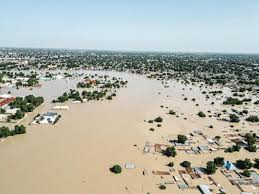As rising water levels in River Niger and River Benue continue to increased, the National Emergency Management Agency (NEMA) has initiated contacts with the identified State governments and relevant stakeholders ahead of highly probable flood disaster that may occur in communities at risk especially those close to the rivers.
According to NEMA Director General, Mrs. Zubaida Umar, while alerting the States on high possibilities of the flood disaster, has also activated the agency’s operation offices, deployed technical staff and prepositioned critical equipment for timely response search and rescue as well as evacuation to safer higher grounds.
Reports revealed that the Nigeria Hydrological Services Agency (NIHSA) had last week issued information that Cameroonian authorities have commenced intermittent release of excess water from Lagdo Dam, which in addition to the high rainfalls in Nigeria have led to the rising water levels in Rivers Benue and Niger.
The observed water level as at Monday 23rd September 2024, in River Benue at Yola has reached the highest warning point at 8.7 meters, while the level in Makurdi has entered the red alert at 9.63 meters.
The situation in Lokoja was also observed to be alarming as the level has reached 8.89 meters with flooding already recorded upstream in Kebbi State.
Reports from NEMA Minna Operations office has indicated the onset of flood disaster along riparian communities in Niger State with human displacement and damage to infrastructure. Damage and loss assessment is already on-going.
The frontline states identified to be at risk of the flooding are Adamawa, Taraba, Benue, Nasarawa, Kogi, Edo, Delta, Anambra, Bayelsa, Cross River, Rivers and Kwara.
With the activation and deployment, NEMA operation offices and technical officers would work with the relevant State Ministries, Departments and Agencies in order to establish Emergency Operation Centres (EOCs) for coordination and activation of local actors for the emergency response.
These would nclude advocacies to communities at risk, evacuation planning, identification of high safe ground for temporary shelters and prepositioning of equipment for evacuation and rescue.
Sector leads have also been alerted to provide priority needs to the impacted persons in the event of displacement of persons to Internally Displaced Persons (IDPs) camps and other safer locations.
























![#Edodecides2024: Obaseki calls for calm, hints at legal action [VIDEO]](https://thediscovererng.com/wp-content/uploads/2024/09/download-6-3-120x86.jpeg)




